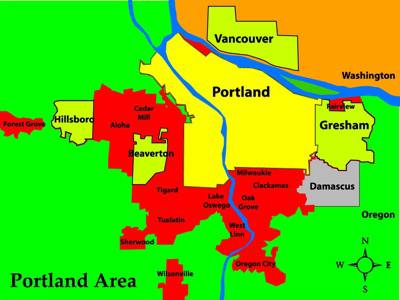No Light Rail in Vancouver!
Just Let People Do What They Want With Their Own Land

Back in 2002, Metro — Portland’s regional planning czar — made several additions
to the region’s urban-
Now, more than six years later, nothing has happened and it looks like nothing will happen. Metro blames it on the high cost of infrastructure. The reality is that Metro planners so gummed up the process that no one could develop their property.
The claim that infrastructure is a barrier is a red herring. As the Antiplanner has
shown here, developers in the Houston area manage to install sewer, water, and roads
themselves and provide land for schools, parks, and other facilities. Developers
pass the cost onto home and other property buyers, who pay it off over a 30-
But before anything could happen in Damascus, Metro planners insisted on having a
plan. “Planning for the new city began with a series of neighborhood meetings and
informal presentations. Aided by planning money provided by Metro, a concept plan
finally was unveiled — to decidedly mixed results. Some property owners who lived
on the hillsides and other areas proposed as housing-
In other words, Metro added people’s land to the urban-
On top of this, instead of designing a system that would make sure that future homebuyers paid for the infrastructure they used, Metro planners created fears among existing residents that their property taxes would go up to subsidize newcomers. The residents revolted and passed an initiative restricting future tax rates. This leaves local officials feeling that their hands are tied.
Metro leaders shake their heads and conclude that Portland will just have to live
with the land that was already in the urban-
As Henry David Thoreau said, “government never of itself furthered any enterprise, but by the alacrity with which it got out of its way.” It is time for planners to get out of the way of Oregon’s future.
